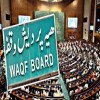Pakistan Accepts India's Stand: POK is Foreign Territory, Not Pakistani

New Delhi 03 June (VNI)In a surprising development, Pakistan has acknowledged in the Islamabad High Court that it has no jurisdiction over Pakistan-Occupied Kashmir (POK), effectively admitting that POK is a foreign territory. This admission came from Pakistan's Additional Attorney General during the court proceedings of a kidnapping case involving Kashmiri poet and journalist Ahmed Farhad Shah.
Ahmed Farhad Shah, a respected poet and journalist from Kashmir, was taken from his residence in Rawalpindi on May 15 by Pakistan's intelligence agencies. His disappearance caused widespread alarm and criticism regarding the conduct of Pakistani authorities, especially their treatment of individuals from POK.
During a hearing on May 31, the Additional Attorney General stated that POK is a foreign territory, meaning that the Pakistani government does not have legal authority over it. This admission became a crucial point in the case, casting doubt on the legitimacy of the actions carried out by Pakistani authorities in POK.
This statement has significant implications for the Kashmir issue, a long-standing and contentious dispute. Pakistan has historically claimed POK as part of its territory, despite the international community recognizing it as a disputed area. The government's admission that POK is foreign territory challenges its previous assertions and could alter the geopolitical landscape of the Kashmir conflict.
India has always maintained that Pakistan-Occupied Kashmir is an integral part of India. According to the Indian government, POK is unlawfully occupied by Pakistan and should be under Indian administration. This position is based on the Instrument of Accession signed in 1947, which legally integrated the entire region of Jammu and Kashmir into India. Pakistan's recent admission may bolster India's stance and its claims in the international arena.
This development has elicited various reactions. Human rights advocates and organizations see this as a positive step toward recognizing POK's distinct status and addressing human rights abuses in the region. Meanwhile, political analysts and critics question the motives behind this admission and its potential effects on the regional conflict.
As Ahmed Farhad Shah's case progresses, the Islamabad High Court's proceedings and the Pakistani government's admission will be closely scrutinized. This rare acknowledgment of POK as foreign territory is a significant milestone in the Kashmir conflict and could lead to further legal and political developments.
In summary, the Pakistani government's admission in the Islamabad High Court that POK is a foreign territory carries substantial implications. It highlights the complex and disputed nature of the Kashmir issue and emphasizes the need for a thoughtful and comprehensive resolution. Coupled with India's firm stance on POK, this development could prompt significant changes in the region. The international community will continue to monitor these events closely, hoping for a peaceful and just resolution to the long-standing conflict. As diplomatic and legal discussions advance, the focus will be on ensuring stability and protecting human rights in the region.
No comments found. Be a first comment here!









